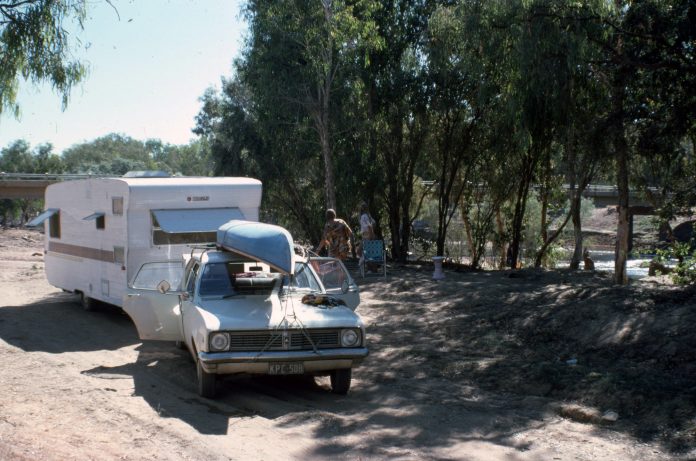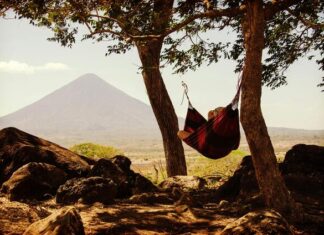The plan, titled RV/Caravanning/Camping Opportunities and Options Strategies, sought to resolve the issue of current amenities in the Central Queensland Highlands’ lack of provision to a growing market.
Planning 4 Sustainable Development director Matt McIntyre said RV tourism accounted for the region’s largest tourist market.
“You’ve got a… new segment of the visitor economy that is now representative of about 30 per cent of all caravan and camping people,” he said.
CHDC development coordinator Paul Thompson said the region’s current amenities were “ill-equipped” to deal with the growing number of tourists to the region.
“We know that people are staying in the region and they are utilising [our] spaces,” Mr Thompson said.
“Early 2020, late 2019… the showgrounds weren’t available… they’ve stayed closed.
“That flagged the situation that we had visitors that we couldn’t accommodate, so they just passed through town because we were full.
“There was nowhere for them to stay.”
Mr Thompson said the lack of accommodation was widespread throughout the region.
“We know that visitors are coming up from the south and coming from elsewhere… but they’re discovering that Carnarvon Gorge is full, so there’s nowhere… for them to stay,” he said.
“They make inquiries into Emerald… maybe the Gemfields… but they may well be full.
“We realised these people are just heading west out to Charleville because they can’t get in… or perceive they can’t fit in and therefore we miss them.
“That’s tens of thousands of visitors that we’re potentially losing… because we can’t accommodate them.”
Mr Thompson said failure to accommodate RV tourists to the region was impacting the region’s ability to capitalise on the tourism sector.
“On average these guys spend $110 a night,” he said.
“If we’ve got 5,000 that are no longer able to stay at the showgrounds… that’s $550,000 not being dropped into town.
“Multiply that by three or four showgrounds around the region and you’re up to about $2.5 million.
“So there is potential big impact.”
Mr McIntyre said the emerging market of self-contained RVs had “caused problems and headaches and court cases in every council all over every state in Australia”.
“The segment of that… travelling visitor economy [is] causing a bit of conflict with existing caravan parks,” he said
“[They] don’t want to get into it or don’t see it as a market yet, thinking that… [it’s] going to affect their business.
“[We want to] work out the best options that reduce conflict and find a bit of security for businesses that exist but for future businesses as well.”
Mr Thompson said solutions must be “good for the community… good for businesses and good for visitors”.
“When the visitors arrive we want the community to welcome them.”
Mr Thompson said the impact of the tourist dollar in the region became evident, once COVID-19 travel restrictions eased.
“The interesting thing with COVID last year was the lack of travellers, travelling,” he said.
“Once the restrictions lifted people realised… these visitors did spend a lot of money in the town because… when the region opened up… the spend went up.
“There’s a definite, visitor economy coming through in strong force… these tourists are making a big impact.
“It was really easy for [businesses]…. to fully understand and appreciate the value of visitors…
“Not only did they realise the visitors were a big impact on their businesses but there were more visitors.”
Mr McIntyre said the region was not only failing to cater to numbers but in the types of amenities provided.
“The demographic changed from above 54 years old to… a lot younger, to mums and dads and kids and grandparents,” he said.
“There were bigger groups, and they’re bringing the kids along.
“You’ve got three kids, plus two parents, plus two grandparents.
“That’s seven people rather than just two.”
Mr Thompson said, “as [the market] is growing, it’s diversifying.”
“People are travelling for longer, you know, rather than a two-week family holidays, it’s a two-year family experience,” he said.
“COVID has had an impact on all families taking that option to travel because… it’s all very well schooling your kid at home, but if you’re going to home school, why not home school them in the Northern Territory or Queensland, travel around have these great experiences as well?
“If we can accommodate an amenity that they want to stay in longer than they could quite easily stay up to two weeks.”
Mr Thompson said this changing market was reflected in caravan sales.
“The other thing is now people work from home and now it’s, ‘well if I can work from home I can work from a caravan’,” he said.
“They’re saying, ‘bugger this, I’m not going to be cooped up in an apartment… I’m going to sit by the beach or sit in the bush or sit by a river and I can still check in.’”
Mr McIntyre said the changing market placed changing demands on the type of amenities sought.
“[Caravans] have got slide-outs now, so all the pads in the existing caravan parks [can’t accommodate them],” he said.
“People typically want a drive-through site, and that’s sometimes due to the size of their rig, other times it’’s due to the fact they can’t reverse or don’t feel comfortable driving.
“We’ve got to get more drive spots and bigger spaces and things like that.”
Mr Thompson said a lack of connectivity in the region was also impacting tourist’s ability to fully enjoy the area.
“It’s not only here but everywhere… it’s the biggest… pitfall of any region; mobile phone reception,” he said.
“Travelling from the main highways here you lose connection.
“We’ve got the problem where people can’t book the products and services they want, they can’t share their experiences with those products.”
Mr Thompson said the lack of provisions for tourists in the region had a knock-on effect because “your reputation is only as good as the last person who stayed there.”
“We’ve got gem galleries out in Rubyvale selling $60,000 sapphire rings, and they’re out in the street trying to get the EFTPOS machine to work,” he said.
“We’ve got a really good opportunity to be the sheer numbers of the market.
“If we can encourage… tourism product without our Central Queensland Highlands than that’s going to be a great thing because not only then will we have people staying here, they’ll be having great experiences and things to do, great places to stay, meeting great people in the towns and communities.
“That is a good all-round experience that is a positive one.”
All decked out and nowhere to go
Paul Albert






